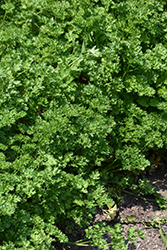>> Home
Triple Curled Parsley
Petroselinum crispum 'Triple Curled'
Height: 12 inches
Spacing: 14 inches
Sunlight:
![]()
Hardiness Zone: (annual)
Other Names: French Parsley
Description:
This fast growing variety produces aromatic, closely curled foliage that is deep green; when mature, it holds for a long time making harvesting easy; use in soups, salads or as a garnish; requires a well prepared fertilized soil and even moisture
Edible Qualities
Triple Curled Parsley is an annual herb that is typically grown for its edible qualities. The fragrant ferny compound dark green leaves are usually harvested from late spring to late summer. The leaves have a bitter taste and a light fragrance.
The leaves are most often used in the following ways:
- Cooking
- Drying
- Seasoning
Planting & Growing
Triple Curled Parsley will grow to be about 12 inches tall at maturity, with a spread of 18 inches. When grown in masses or used as a bedding plant, individual plants should be spaced approximately 14 inches apart. Although it's not a true annual, this fast-growing plant can be expected to behave as an annual in our climate if left outdoors over the winter, usually needing replacement the following year. As such, gardeners should take into consideration that it will perform differently than it would in its native habitat.
This plant is typically grown in a designated herb garden. It should only be grown in full sunlight. It prefers to grow in average to moist conditions, and shouldn't be allowed to dry out. It is not particular as to soil pH, but grows best in rich soils. It is highly tolerant of urban pollution and will even thrive in inner city environments. This is a selected variety of a species not originally from North America.
Triple Curled Parsley is a good choice for the edible garden, but it is also well-suited for use in outdoor pots and containers. It is often used as a 'filler' in the 'spiller-thriller-filler' container combination, providing a canvas of foliage against which the thriller plants stand out. Note that when growing plants in outdoor containers and baskets, they may require more frequent waterings than they would in the yard or garden.
